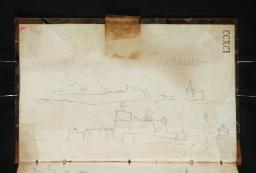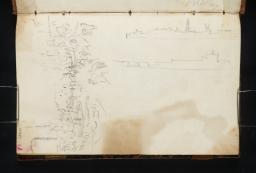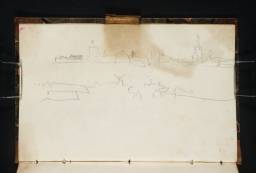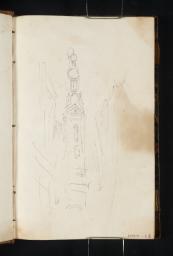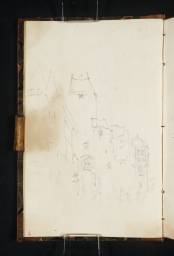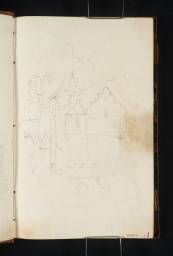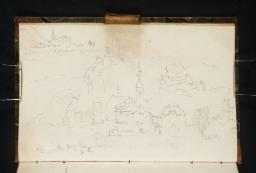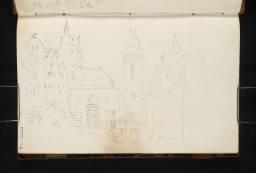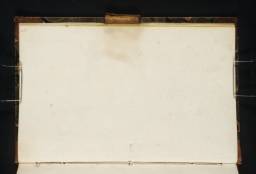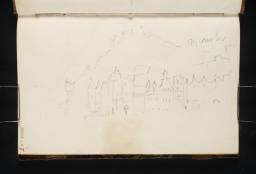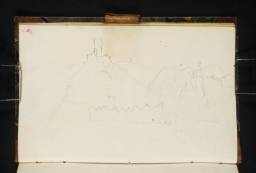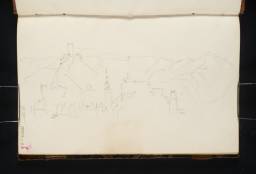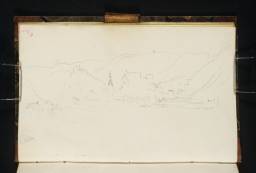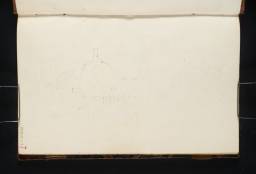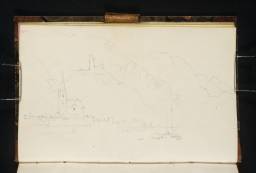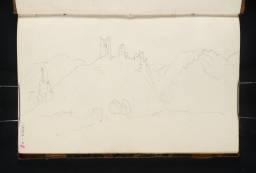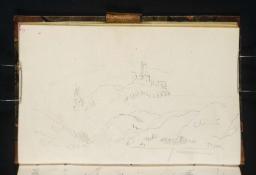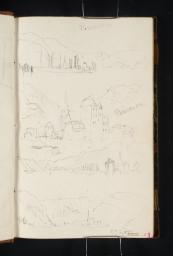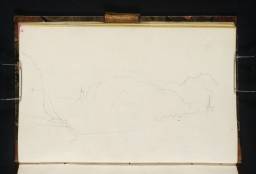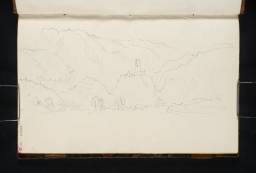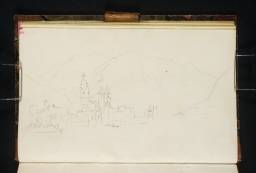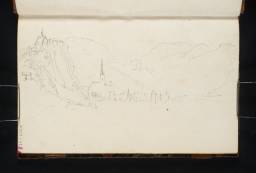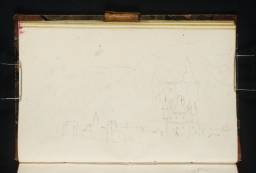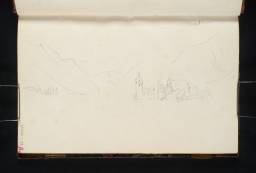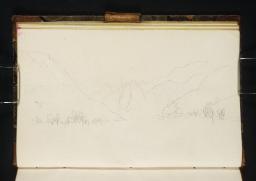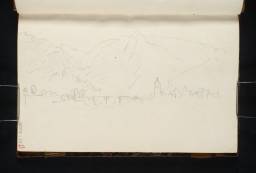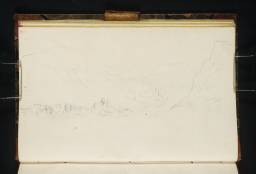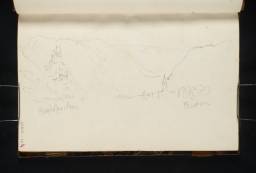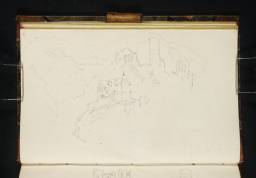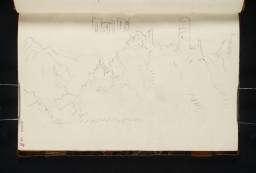CCXCI 1–68a
Sketchbook quarter-bound in boards covered with brown, black and white marbled paper with brown leather spine and corners; three broken leather loops (two at either end of front cover and one in middle of back cover) for holding a pencil and fastening.
White paper butterfly-shaped label is affixed upside down on the outside of the back cover, inscribed in black ink by Turner ‘5 Cockem to Cob’.
Inscribed in black ink by Turner with five short vertical score lines on top of text block
Signed and inscribed by H.S. Trimmer in black ink ‘No 297 Contains 55 | Leaves = Pencil Sketches – | on both sides – ’ and signed in black ink by Charles Turner; signed in pencil by Charles Locke Eastlake ‘C.L.E.’ and by John Prescott Knight ‘JPK’ all at the bottom of folio 68 verso (Tate D28656; Turner Bequest CCXCI 68 a), orientated inversely to the foliation
Blind-stamped with Turner Bequest monogram on leather spine of back cover
Stamped in black ‘CCXCI’ top right of front cover and top left of inside front cover paste-down
Inscribed in pencil ‘CCXCI’ inversely at bottom of inside back cover paste-down
68 leaves of cream laid writing paper made on a double-faced mould
Chain lines: 25–6 mm apart; Laid lines: 9 per cm
Watermark: French imperial eagle with ‘N’ on his breast
Countermark: v d meulen | & comp.
Unidentified mill and maker
Approximate size of page 156 x 100 mm
White paper butterfly-shaped label is affixed upside down on the outside of the back cover, inscribed in black ink by Turner ‘5 Cockem to Cob’.
Inscribed in black ink by Turner with five short vertical score lines on top of text block
Signed and inscribed by H.S. Trimmer in black ink ‘No 297 Contains 55 | Leaves = Pencil Sketches – | on both sides – ’ and signed in black ink by Charles Turner; signed in pencil by Charles Locke Eastlake ‘C.L.E.’ and by John Prescott Knight ‘JPK’ all at the bottom of folio 68 verso (Tate D28656; Turner Bequest CCXCI 68 a), orientated inversely to the foliation
Blind-stamped with Turner Bequest monogram on leather spine of back cover
Stamped in black ‘CCXCI’ top right of front cover and top left of inside front cover paste-down
Inscribed in pencil ‘CCXCI’ inversely at bottom of inside back cover paste-down
68 leaves of cream laid writing paper made on a double-faced mould
Chain lines: 25–6 mm apart; Laid lines: 9 per cm
Watermark: French imperial eagle with ‘N’ on his breast
Countermark: v d meulen | & comp.
Unidentified mill and maker
Approximate size of page 156 x 100 mm
Accepted by the nation as part of the Turner Bequest 1856
Exhibition history
References
This is the last of the five sketchbooks used by Turner on his tour of 1839. It is inscribed ‘5 Cockem to Cob’ on a paper label cut into the shape of a butterfly affixed to the back cover and is also listed on the cover of the Trèves to Cochem and Coblenz to Mayence sketchbook (Turner Bequest CCXC). The first forty pages document Turner’s journey down the Moselle (or Mosel, as it is known in Germany) from Cochem to Koblenz in considerable detail, with each page usually containing a single sketch or a carefully planned composition. Cecilia Powell writes that the nature of these drawings suggests ‘a far more leisurely journey along this part of the Moselle, as though Turner were unwilling to leave it’.1 Thereafter the drawings in this sketchbook document Turner’s return home down the Rhine from Koblenz to Bonn. These views are recorded much less carefully, in a slight and summary manner. The final section of the sketchbook depicts the artist’s route to the coast via Aachen.
The paper in this sketchbook is either of Dutch, Belgian or possibly German origin. The watermark shows a version of the Napoleonic imperial eagle, carrying a sword, sceptre and surmounted by a crown. It has a capital ‘N’ on its breast. The paper historian Peter Bower has shed light on the origin and meaning of this unusual imperial watermark, writing that:
Parts of the low countries were an “Independent” Republic after “liberation” by French Republican armies and several Dutch mills made various “Napoleonic” papers until 1815. However the binding style is more like that seen in the Rhineland and southern Germany and the small butterfly-shaped paper label on the cover is very typical of those found on ledgers and notebooks used for the annual Births, Marriages, and Deaths Registers held by each small town during the Rhineland in this period.2
For more information on this part of the trip see the general Introduction ‘Itinerary’ section.
How to cite
Alice Rylance-Watson, ‘Cochem to Coblenz – Home Sketchbook 1839’, sketchbook, September 2013, in David Blayney Brown (ed.), J.M.W. Turner: Sketchbooks, Drawings and Watercolours, Tate Research Publication, November 2014, https://www

